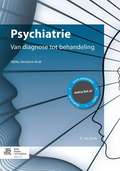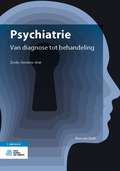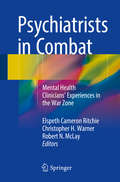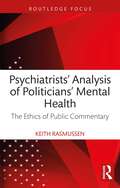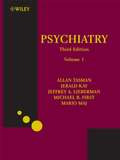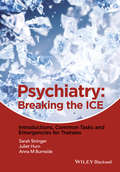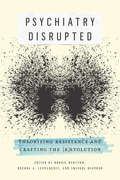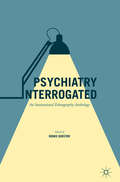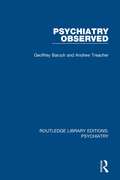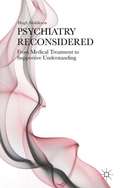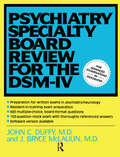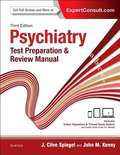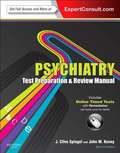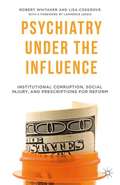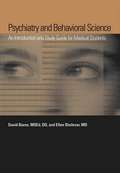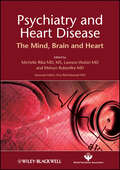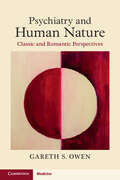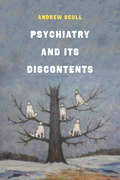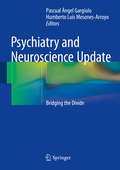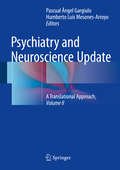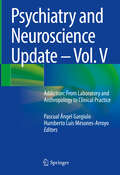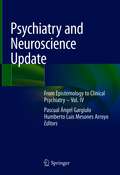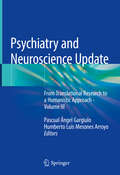- Table View
- List View
Psychiatrie: Van diagnose tot behandeling
by R. van DethPsychiatrieVan diagnose tot behandelingDit boek geeft een overzicht van de moderne psychiatrie in al haar facetten. Het eerste deel beschrijft de wetenschappelijke principes en methoden van de psychiatrie. Daarbij wordt op evenwichtige wijze aandacht geschonken aan biologische, psychologische en sociale invalshoeken. In het tweede deel staan de voornaamste psychische stoornissen centraal. Aan de hand van praktijkvoorbeelden komen daarvan telkens de essentiële kenmerken, verklaringen en behandelvormen aan bod.Het boek probeert jargon zoveel mogelijk te vermijden en is in heldere taal geschreven. Het is dan ook bedoeld voor iedereen die op een snelle en toegankelijke manier kennis wil maken met het psychiatrisch werkveld. Dat kunnen studenten zijn of geïnteresseerde leken, maar ook mensen met psychische problemen en hun directe omgeving. Verder is het boek heel geschikt voor wie beroepshalve met de wereld van de psychiatrie te maken krijgt: zorgprofessionals, maatschappelijk werkers en personeelsmanagers, maar ook degenen die werken bij politie en justitie of in het onderwijs. Mede op basis van de DSM-5 is deze vijfde herziene editie in veel opzichten geactualiseerd. Daarnaast biedt nu ook een website ondersteunende (internet)bronnen bij ieder hoofdstuk. Drs. Ron van Deth is psycholoog en publicist en verbonden aan het Europees Instituut voor Educatie in Driebergen.
Psychiatrie: Van diagnose tot behandeling
by Ron van DethDit boek biedt een toegankelijk overzicht van alle facetten van de moderne psychiatrie: van diagnose tot behandeling. Daarbij wordt nadrukkelijk ingegaan op innovatieve bewegingen in de Nederlandse GGZ, zoals eigen regie, herstel, gezamenlijke besluitvorming, zelfmanagement en ervaringsdeskundigheid. Het boek is gericht op iedereen die in zijn werk of studie te maken krijgt met psychische problematiek.De zesde druk van Psychiatrie: Van diagnose tot behandeling is inhoudelijk verbeterd, geactualiseerd en uitgebreid, waardoor het completer is geworden. De nieuwe opmaak met tal van illustraties maakt het boek aantrekkelijker en overzichtelijker. In ieder hoofdstuk is een studieblok opgenomen met samenvattingen, kernbegrippen en doelen. Ook biedt deze editie studenten ruime mogelijkheden om hun kennis en inzicht te oefenen en te toetsen met flashcards én 260 multiplechoicevragen. De uitgebreide website bij dit boek heeft behalve links naar video’s, films, websites en boeken, ook videoclips die belangrijke aspecten van de hoofdstukken toelichten. Door deze toevoegingen offline en online is het boek uitermate geschikt als studiemateriaal.Een ander belangrijk nieuw element zijn de psycho-educatieve teksten. Deze maken duidelijk wat zorgprofessionals te bieden hebben, maar vooral wat cliënten en hun directe omgeving zélf kunnen doen. Hiermee richt het boek zich ook op mensen met psychische problematiek.Psychiatrie: Van diagnose tot behandeling is geschreven door drs. Ron van Deth. Hij is psycholoog en publicist en verbonden aan het Europees Instituut voor Educatie in Driebergen. Hij was jarenlang eindredacteur van PsychoPraktijk en schreef onder andere Psychotherapie: Van theorie tot praktijk, Inleiding in de psychopathologie en (als co-auteur) Pedagogische adviezen voor speciale kinderen.
Psychiatrists in Combat
by Elspeth Cameron Ritchie Christopher H. Warner Robert N. MclayThis book tells the professional and personal experiences of American military psychiatrists and their colleagues in the longest conflict in American history. These highly trained men and women treat service members for the psychological consequences from their experiences in battle, including killing enemy combatants; seeing wounded and killed civilian casualties; losing their friends in combat; factoring in personal mental health needs, including psychiatric drug treatment; and potentially dealing with their own physical injuries from being shot or blown up. The volume consists of 20 short first-person case studies from the mental health providers who have been risking their lives while treating patients in the battlefield since 9/11. Written by expert psychiatrists who have experienced these challenges directly, this texts offers both a clinical and personal account that is not found anywhere else. Topics include tips on providing psychotherapy in battle, evaluating and treating detainees in war prisons such as Abu Ghraib and Guantanamo Bay, and the unique challenges of prescribing medication to patients who are also comrades in war. Psychiatrists in Combat is uniquely positioned to be a valuable resource for psychiatrists interested in trauma and veterans, psychologists, social workers, occupational therapists, military health personnel, and mental health professionals interested in military psychiatry.
Psychiatrists' Analysis of Politicians' Mental Health: The Ethics of Public Commentary
by Keith RasmussenThis book discusses the validity, ethics, and usefulness of professional public commentary of politician’s mental health and provides an alternative model for professionals to do so in an ethical manner.Rendering public opinions about politician’s mental health, particularly when the professional has not conducted a first-hand assessment of the individual, can be problematic and unethical. This book reviews the legitimate methods of psychiatric and psychological evaluations, abuses of psychiatry, and ethical perspectives on publicly voicing opinions regarding public figures, and proposes an alternative assumption model for mental health professionals to render a public opinion. It is a great resource for practicing psychologists and psychiatrists to reflect on their own processes when examining the mental health of politicians.Students and trainees in the mental health sector will come away from this book with a better understanding of the ethical concerns inherent in commenting publicly on public officials’ mental health, and they'll find valuable guidance on how to do so in an ethical way.
Psychiatry
by Michael B. First Jeffrey A. Lieberman Mario Maj Allan Tasman Jerald KayExtensively revised and updated this edition reflects the progress and developments in the field. With 127 chapters and over 400 contributors this book is a truly comprehensive exposition of the specialty of psychiatry.Written by well-known and highly regarded experts from around the world, it takes a patient-centered approach making it an indispensable resource for all those involved in the care of patients with psychiatric disorders.For this new edition, the section on the Neuroscientific Foundations of Psychiatry has been completely revised, with a new author team recruited by Section Editors Jonathan Polan and Eric Kandel. The final section, Special Populations and Clinical Settings, features important new chapters on today's most urgent topics, including the homeless, restraint and geriatric psychiatry.Key features include:Coverage of the entire field of psychiatry, from psychoanalysis to pharmacology and brain imaging, including family relations, cultural influence and change, epidemiology, genetics and behavioral medicineClinical vignettes describing current clinical practice in an attractive designNumerous figures and tables that facilitate learning and comprehension appear throughout the textClear comparisons of the DSM-IV-TR and ICD-10 criteria for easy understanding in a global contextDiagnostic and treatment decision trees to help both the novice and experienced readerThe chapter on Cognitive Behavioral Therapies by Edward Friedman, Michael Thase and Jesse Wright is freely available. Please click on Read Excerpt 2 above to read this superb exposition of these important therapies.
Psychiatry
by Sarah L. Stringer Anna M. Burnside Juliet HurnPsychiatry: Breaking the ICE contains everything psychiatry trainees need in order feel confident and competent in general adult inpatient and community placements. A practical and reassuring guide to life as a psychiatrist, structured around the tasks expected both in day-to-day practice and in out-of-hours work Key themes running throughout the book include ethical and legal issues, risk assessment and management, patient experience and safe prescribing The authors are closely involved in the training, mentoring and supervision of core trainees, and know the real-world challenges faced by junior psychiatrists
Psychiatry Disrupted
by Shaindl Diamond Bonnie Burstow Brenda A. LefrançoisThere is growing international resistance to the oppressiveness of psychiatry. While previous studies have critiqued psychiatry, Psychiatry Disrupted goes beyond theorizing what is wrong with it to theorizing how we might stop it. Introducing readers to the arguments and rationale for opposing psychiatry, the book combines perspectives from anti-psychiatry and critical psychiatry activism, mad activism, antiracist, critical, and radical disability studies, as well as feminist, Marxist, and anarchist thought. The editors and contributors are activists and academics - adult education and social work professors, psychologists, prominent leaders in the psychiatric survivor movement, and artists - from across Canada, England, and the United States. From chapters discussing feminist opposition to the medicalization of human experience, to the links between psychiatry and neo-liberalism, to internal tensions within the various movements and different identities from which people organize, the collection theorizes psychiatry while contributing to a range of scholarship and presenting a comprehensive overview of resistance to psychiatry in the academy and in the community. Contributors include Simon Adam (University of Toronto), Rosemary Barnes University of Toronto, Peter Beresford (Brunel University), Bonnie Burstow (University of Toronto), Chris Chapman (York University), Mark Cresswell (Durham University), Shaindl Diamond (York University), Chava Finkler (Memorial University), Ambrose Kirby (therapist in private practice, Brenda A. LeFrançois (Memorial University of Newfoundland), Mick McKeown (University of Central Lancashire), Robert Menzies (Simon Fraser University), China Mills (Oxford University), Tina Minkowitz (World Network of Users and Survivors of Psychiatry), Ian Parker (University of Leicester), Susan Schellenberg, Helen Spandler (University of Central Lancashire), and AJ Withers (York University). A courageous anthology, Psychiatry Disrupted is a timely work that asks compelling activist questions that no other book in the field touches.
Psychiatry Disrupted: Theorizing Resistance and Crafting the (R)evolution
by Shaindl Diamond Bonnie Burstow Brenda A. LeFrançoisThere is growing international resistance to the oppressiveness of psychiatry. While previous studies have critiqued psychiatry, Psychiatry Disrupted goes beyond theorizing what is wrong with it to theorizing how we might stop it. Introducing readers to the arguments and rationale for opposing psychiatry, the book combines perspectives from anti-psychiatry and critical psychiatry activism, mad activism, antiracist, critical, and radical disability studies, as well as feminist, Marxist, and anarchist thought. The editors and contributors are activists and academics - adult education and social work professors, psychologists, prominent leaders in the psychiatric survivor movement, and artists - from across Canada, England, and the United States. From chapters discussing feminist opposition to the medicalization of human experience, to the links between psychiatry and neo-liberalism, to internal tensions within the various movements and different identities from which people organize, the collection theorizes psychiatry while contributing to a range of scholarship and presenting a comprehensive overview of resistance to psychiatry in the academy and in the community. Contributors include Simon Adam (University of Toronto), Rosemary Barnes University of Toronto, Peter Beresford (Brunel University), Bonnie Burstow (University of Toronto), Chris Chapman (York University), Mark Cresswell (Durham University), Shaindl Diamond (York University), Chava Finkler (Memorial University), Ambrose Kirby (therapist in private practice, Brenda A. LeFrançois (Memorial University of Newfoundland), Mick McKeown (University of Central Lancashire), Robert Menzies (Simon Fraser University), China Mills (Oxford University), Tina Minkowitz (World Network of Users and Survivors of Psychiatry), Ian Parker (University of Leicester), Susan Schellenberg, Helen Spandler (University of Central Lancashire), and AJ Withers (York University). A courageous anthology, Psychiatry Disrupted is a timely work that asks compelling activist questions that no other book in the field touches.
Psychiatry Interrogated
by Bonnie BurstowThis edited volume is an anthology of institutional ethnography (IE) inquiries into psychiatry--the first ever to be written. It focuses on a large variety of different geographic locations and constitutes a major contribution to anti/critical psychiatry, as well as institutional ethnography. Themes include the DSM, the use and protection of problematic psychiatric research, the penetration of psychiatry into the workplace. Adding depth and breath, the contributors, while all are schooled in IE, come from a large variety of walks of life, authors including: academics, psychiatric survivors, investigative reporters, activists, nurses, artists, and lawyers--each bringing their own unique expertise/standpoint to bear. The result is an intellectually rigorous book, contributions to several disciplines, ammunition for activism, and a compelling read that cannot be put down.
Psychiatry Interrogated: An Institutional Ethnography Anthology
by Bonnie BurstowThis edited volume is an anthology of institutional ethnography (IE) inquiries into psychiatry—the first ever to be written. It focuses on a large variety of different geographic locations and constitutes a major contribution to anti/critical psychiatry, as well as institutional ethnography. Themes include the DSM, the use and protection of problematic psychiatric research, the penetration of psychiatry into the workplace. Adding depth and breath, the contributors, while all are schooled in IE, come from a large variety of walks of life, authors including: academics, psychiatric survivors, investigative reporters, activists, nurses, artists, and lawyers—each bringing their own unique expertise/standpoint to bear. The result is an intellectually rigorous book, contributions to several disciplines, ammunition for activism, and a compelling read that cannot be put down.
Psychiatry Observed (Routledge Library Editions: Psychiatry #4)
by Geoffrey Baruch Andrew TreacherOriginally published in 1978, with the reform of the 1959 Mental Health Act under consideration, it was time to re-examine the recent policy of desegregating the mentally ill and treating them within general hospital psychiatric units rather than in mental hospitals. This shift in policy reflected a number of significant trends in contemporary British psychiatry. It signified the acceptance of the idea that mental disorder is like a physical illness and should be treated as such, within the same buildings. It had also brought the psychiatric profession closer to the mainstream of medicine and had conferred on it a status similar to that enjoyed by other branches of the medical profession. In this study, however, the authors question much of British psychiatric practice at the time. Part of the book is devoted to explaining how the psychiatric profession had been able to establish a hegemony over the mental health field, and consequently subordinate the other mental health professions to minor roles. The main emphasis of the book is on the controversial policy of desegregation of the mentally ill. The historical development of general psychiatric units is discussed, then a case study documenting the ‘careers’ of three patients who passed through one such unit is presented, providing a fascinating insight into the way in which the unit operated as a diagnostic and therapeutic centre. Finally, an analysis is made of some of the issues raised by the study. In particular, the staff structure of psychiatric centres and the processes of assessment and treatment are considered in detail.
Psychiatry Reconsidered
by Hugh MiddletonPsychiatry suffers a lot of criticism, not least from within its own scientifically founded medical world. This book provides an account of mental health difficulties and how they are generally addressed in conventional medical circles, alongside critical reviews of the assumptions underpinning them to encourage more humanitarian perspectives.
Psychiatry Specialty Board Review For The DSM-IV (Continuing Education in Psychiatry and Psychology Series #5)
by John Duffy J. Bryce McLaulinFirst published in 1996. Routledge is an imprint of Taylor & Francis, an informa company.
Psychiatry Test Preparation And Review Manual
by J. Clive Spiegel John M. KennyCovering every area of the ABPN board exam, the 3rd Edition of Psychiatry Test Preparation and Review Manual, by Drs. J. Clive Spiegel and John M. Kenny, includes 1,100 questions, video vignettes, and an online timed assessment to prepare you for certification or recertification success. You'll know exactly what to expect when exam day arrives, thanks to current coverage of the latest research in both psychiatry and neurology, as well as a format that precisely mimics all aspects of the written exam. Features six tests of 150 multiple-choice questions each, as well as 160 multiple-choice questions related to case vignettes. Allows you to see results broken down by topic online, so you can target areas needing further study. Bookmarking and score archiving are also available online. Allows you to exclude topics which are not included on the MOC, such as neuroscience and neurology, so you can more narrowly focus your study. Gives clear explanations for both insufficient/incorrect and correct answers, and provides recommended readings from key textbooks. Reflects the latest research and clinical practice in both psychiatry and neurology.
Psychiatry Test Preparation and Review Manual (Second Edition)
by J. Clive Spiegel John M. KennyUpdated to reflect all of the latest research in psychology and neurology, Psychiatry Test Preparation and Review Manual, 2nd Edition precisely mirrors the written ABPN board exam so you can expertly prepare and achieve your highest score. This psychiatry Q book now features over one thousand questions including an online component with all MCQs from the text, ensuring you know exactly what to expect when exam day arrives. Enhance your preparation with recommended readings from key textbooks in the field. Understand why your answers are correct or incorrect through detailed explanations of each possible response. Study as effectively as possible with 300 brand-new questions that match the current exam format, as well as 160 clinical vignette questions that are stylistically based on those appearing on the ABPN board exam and other standardized tests. Experience a realistic exam simulation online at www. expertconsult. com, where you can take timed assessment tests as well as untimed practice tests, target specific areas of weakness, exclude topics not included on the MOC exam (such as child psychiatry and neurology), and more!
Psychiatry Under the Influence
by Robert Whitaker Lisa CosgrovePsychiatry Under the Influence investigates how the influence of pharmaceutical money and guild interests has corrupted the behavior of the American Psychiatric Association and academic psychiatry during the past 35 years. The book documents how the psychiatric establishment regularly misled the American public about what was known about the biology of mental disorders, the validity of psychiatric diagnoses, and the safety and efficacy of its drugs. It also looks at how these two corruptinginfluences encouraged the expansion of diagnostic boundaries and the creation of biased clinical practice guidelines. This corruption has led to significant social injury, and in particular, a societal lack of informed consent regarding the use of psychiatric drugs, and the pathologizing of normal behaviors in children and adults. The authors argues that reforming psychiatry will require the neutralization of these two corrupting influences—pharmaceutical money and guild interests—and the establishment of multidisciplinary authority over the field of mental health.
Psychiatry and Behavioral Science: An Introduction and Study Guide for Medical Students
by David Baron Ellen H. SholevarThis easy-to-read, unique format text combines introductory psychiatry content with board-style review questions written for first and second year medical students. The book is intended to be used as the required text for pre-clinical psychiatric education. The user-friendly split page format includes clinical vignettes, "fun facts," and relevant art work. Each chapter contains board review questions that prepare the medical student for USMLE Step 1 and COMLEX 1. By using a clinical approach consistent with the needs of today's medical students, the authors hope to prepare first and second year medical students for their exams and clinical rotations.
Psychiatry and Heart Disease
by Michelle Riba Lawson Wulsin Divy Ravindranath Melvyn RubenfireThis unique book will help psychiatrists to understand better the risks of cardiovascular illness and cardiologists to appreciate possible pathophysiological links with psychiatric conditions. It describes the common psychiatric conditions, their key features and how they may influence cardiovascular disease, outcomes, and quality of life. It also considers the cardiovascular complications that may arise as a result of mental illness. In an exciting, collaborative approach, psychiatrists and cardiologists combine their expertise throughout the book to provide guidance on the best way to manage such patients, considering the patient as a whole, not the individual conditions.
Psychiatry and Human Nature: Classic and Romantic Perspectives
by Gareth S. OwenPsychiatry is medicine's most multi-disciplinary specialty and arguably its most intellectually and emotionally demanding. It has long attracted dual interpretations from cool, detached perspectives valuing objectivity (classic) to hotter, embodied and more political perspectives valuing subjectivity (romantic). Professor Owen argues that psychiatry should become more aware of classic and romantic threads that run through it. He approaches core topics in psychiatry and throughout the book both research and case material are used to animate the concepts. The author relates psychiatry to questions in philosophical anthropology and ethics. He presents human nature, mental disorder, and human freedom as inherently inter-related. This is a book of broad appeal to anyone interested in psychiatry and why this branch of medicine has ethical, legal and political significance.
Psychiatry and Its Discontents
by Andrew ScullWritten by one of the world’s most distinguished historians of psychiatry, Psychiatry and Its Discontents provides a wide-ranging and critical perspective on the profession that dominates the treatment of mental illness. Andrew Scull traces the rise of the field, the midcentury hegemony of psychoanalytic methods, and the paradigm’s decline with the ascendance of biological and pharmaceutical approaches to mental illness. The book’s historical sweep is broad, ranging from the age of the asylum to the rise of psychopharmacology and the dubious triumphs of “community care.” The essays in Psychiatry and Its Discontents provide a vivid and compelling portrait of the recurring crises of legitimacy experienced by “mad-doctors,” as psychiatrists were once called, and illustrates the impact of psychiatry’s ideas and interventions on the lives of those afflicted with mental illness.
Psychiatry and Neuroscience Update
by Pascual Ángel Gargiulo Humberto Luis Mesones ArroyoThe intention of this unique title is to bridge the gap between psychiatry and neuroscience, allowing a fruitful dialogue between both sciences. Recognizing that psychiatry has received important contributions from the basic neurosciences and that the basic neurosciences have received inspiration and objectives from the open problems of psychiatry, Psychiatry and Neuroscience: Bridging the Divide is designed to identify the borders, trends and implications in both fields today. Comprehensive and developed by a renowned group of experts from both fields, the book is divided into four parts: Epistemological Considerations About the Study of Normal and Abnormal Human Behaviors; From Basic Neurosciences to Human Brain; Neurosciences, Learning, Teaching and the Role of Social Environment and Explaining Human Pathological Behaviors: From Brain Disorders to Psychopathology. A unique and invaluable addition to the literature in psychiatry and neuroscience, Psychiatry and Neuroscience: Bridging the Divide offers an important and clearer understanding of the relationship between psychiatry and neuroscience.
Psychiatry and Neuroscience Update - Vol. II
by Pascual Ángel Gargiulo Humberto Luis Mesones-ArroyoThe aim of this unique book is to provide an overview of recent advances bridging the gap between psychiatry and neuroscience, allowing a fruitful dialogue between both sciences. The emerging interactions and mutual contributions between neuroscience and psychiatry are here recognized. This book is designed to identify the borders, trends and implications in both fields today. Comprehensive and developed by a renowned group of experts from both fields, the book is divided into four parts: Epistemological Considerations About the Study of Normal and Abnormal Human Behaviors; From Basic Neurosciences to Human Brain; Neurosciences, Learning, Teaching and the Role of Social Environment; and Explaining Human Pathological Behaviors: From Brain Disorders to Psychopathology. A unique and invaluable addition to the literature in psychiatry and neuroscience, Psychiatry and Neuroscience Update - Vol. II: A Translational Approach offers an important and clearer understanding of the relationship between these two disciplines. This book is directed to students, professionals and researchers of medicine, psychology, psychopedagogy and nursery.
Psychiatry and Neuroscience Update – Vol. V: Addiction: From Laboratory and Anthropology to Clinical Practice
by Pascual Ángel Gargiulo Humberto Luis Mesones-ArroyoThis book offers a multidisciplinary approach to the phenomenon of addiction, including a discussion of its anthropological, neurological, psychiatric and social aspects. The editors have maintained this multidisciplinary criterion since the first volume of the Psychiatry and Neuroscience Update collection. Approaching a topic from multiple points of view guides the mentality to open to biological and psychological relationships and facilitates translational extrapolations. The ability to establish relationships, closer or more distant, but always binding, is thus stimulated, whether for study, research or the interpretation of clinical reality. As in previous volumes, the book opens with a part dedicated to anthropological and philosophical aspects, thus ensuring the validity of the humanistic aspect. Intersubjectivity, epistemological reflections, the meaning of ecstasy, and philosophical reflection leading to therapy are explored. Part 2—From Basic Neurosciences to Human Brain—presents a set of basic investigations with high translational content. This corresponds with the editors’ intention to build bridges, here between the basic and the clinical, favoring the translational. Chapters present topics of interest to both fields, such as the neurobiology of addictions, cocaine, and benzodiazepines. Part 3 establishes links between neurosciences, learning, teaching, and the social environment. It begins with a chapter on executive functioning before discussing excessive use of computer technology and educational interventions for patients with alcohol addiction. The fourth part of the book attempts to explain pathological human behavior. It is about establishing links between brain disorders and diseases in the strict sense. Among other topics, chapters deal with cognitive dysfunction in addiction, neuroimaging, and stigma around substance use disorders. Psychiatry and Neuroscience Update: Addiction: From Laboratory and Anthropology to Clinical Practice – Vol. V was edited and authored by a multidisciplinary group of authors and will be vital for an equally multidisciplinary group of readers: psychiatrists, psychologists, neuroscientists, and any other clinician or researcher that is interested in addictions. Those in the humanities, particularly anthropologists and philosophers, will find the first part of great interest.
Psychiatry and Neuroscience Update: From Epistemology to Clinical Psychiatry – Vol. IV
by Pascual Ángel Gargiulo Humberto Luis Mesones ArroyoThis broad and thought-provoking volume provides an overview of recent intellectual and scientific advances that intersect psychiatry and neuroscience, offering a wide range of penetrating insights in both disciplines. The fourth volume on the topic in the last several years from a varying panel of international experts identifies the borders, trends and implications in both fields today and goes beyond that into related disciplines to seek out connections and influences. Similar to its three Update book predecessors, Psychiatry and Neuroscience – Volume IV presents a range of interesting topics in the main disciplines – psychiatry and neuroscience – and attempts to provide deeper comprehension or explication of the normal and diseased human mind, its biological correlates and its biographical and existential implications. This engaging volume continues the previous style of exploring different disciplines and trying to integrate disciplinary evidence from varying points of view in an organic manner. The first section is about epistemological considerations regarding the study of normal and abnormal human behaviors, including, for example, the topic of phenomenological psychopathology and phenomenological psychiatry in relation to schizophrenia and substance misuse, among other topics. Section 2 addresses issues around the translation of basic neuroscience to expression in the human brain and behavioral implications. Section 3 discusses the issues of learning, teaching and the role of social environment in the field of neuroscience. Finally section 4 reviews various perspectives on explaining human pathological behaviors -- from brain disorders to psychopathology.
Psychiatry and Neuroscience Update: From Translational Research to a Humanistic Approach - Volume III
by Pascual Ángel Gargiulo Humberto Luis Mesones ArroyoThis broad and thought-provoking volume provides an overview of recent intellectual and scientific advances that bridge the gap between psychiatry and neuroscience, offering a wide range of penetrating insights in both disciplines. The third volume on the topic in the last several years from a varying panel of international experts, this title identifies the borders, trends and implications in both fields today and goes beyond that into related disciplines to seek out connections and influences. Similar to its two Update book predecessors, Psychiatry and Neuroscience – Volume III presents the current state-of-the-art in the main disciplines – psychiatry and neuroscience – and attempts to provide deeper comprehension or explication of the normal and diseased human mind, its biological correlates and its biographical and existential implications. This engaging volume continues the previous style of exploring different disciplines and trying to integrate disciplinary evidence from varying points of view in an organic manner. Developed for clinicians and researchers in the fields of medicine, psychiatry, psychology and biology, this third volume also will be of great interest to students and university professors of diverse disciplines.
